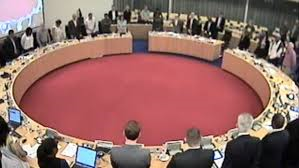 Last week we had local elections in the Netherlands and today the new councilmembers have been installed in Amsterdam (and many other municipalities). With that ended for me a period of nearly 8 years of being active in local politics - in the Amsterdam city districts Zeeburg and later in Amsterdam East. Time for a quick look back: what was better or worse than expected?
Last week we had local elections in the Netherlands and today the new councilmembers have been installed in Amsterdam (and many other municipalities). With that ended for me a period of nearly 8 years of being active in local politics - in the Amsterdam city districts Zeeburg and later in Amsterdam East. Time for a quick look back: what was better or worse than expected?
What was better than expected?
For quite a few becoming active in a city district is meant as a first step in politics, up to higher grounds. For me it was going for a level that I expected to be practical and hands-on, less dominated by party-politics. And yes, it really is. At least: it can be – if you want to, and of course there enough pieces of legislation that are not hands-on. But overall this expectation came out – and to a greater extent than expected.
Another expectation – or hope – that came out was that focussing on practical things will make it easier to bridge divides between parties. Therefore it was easier to form majorities per issue, bridging the coalition – opposition divide and also bridging ideological gaps. Yes, of course, not everyone felt comfortable to vote outside party or coalition politics – but still it happened often enough.
And to have the famous three examples: I also expected that it should be possible to see results even within one election cycle. Yes, it turned out to be that way. This is the advantage of being busy with local issues and very practical solutions.
Ok – but what turned out to be below expectation or wasn’t expected at all?
There was way more of what I would call pro-forma work – legislation where there is not really a choice. This is mainly due to city wide agreements or legislation from a higher level that has to be adopted. Unnecessary work and very bureaucratic. And as the tendency to city-wide policies increased over the years the amount of no-choice-legislation increased also.
The second thing is something that only became obvious in the second term: the influence of culture and people. Yes, this is of course in every team and working environment an issue, but in other settings it is usually limited by the need for professionalism or the mere fact of a contract that can be dissolved. In the political arena this pressure is less and therefore this is less constraint.
The last thing I didn’t expect to that extent is the amount of headline-driven politics. This is of course part of politics, but as local politics is more pragmatic it could be expected that that headline-politics is less an issue. But this has changed over the years. It seems that the national development has found its way down to local and even district politics. Unfortunately – if you ask me. This brought more polarisation and targeting persons instead of issues to the local level. Over time this can make local politics more divided and reduce the potential of bridging the gap between parties.
I’m looking back onto eight interesting years and I am glad that I had this opportunity. It costs a lot of time but is a rewarding experience. Politics will stay fascinating and will play role for me also in the future – but eight years is enough on this level. So it’s time for something new – and good to see that there are plenty of new and enthusiastic local politicians!